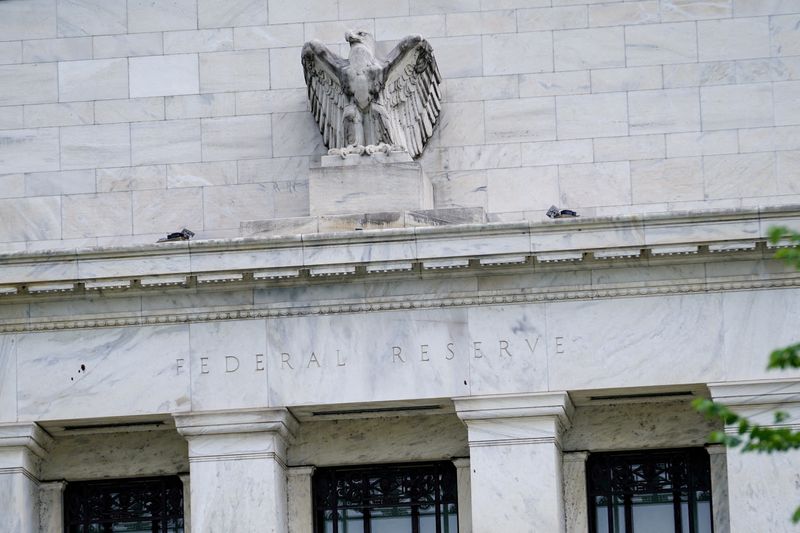By Suzanne McGee
(Reuters) - A golden era for cash may be winding down as the Federal Reserve gets ready to cut interest rates. Many fans of the investment class are staying put anyway.
Assets in U.S. money markets hit a record $6.24 trillion this month, data from the Investment Company Institute showed on Aug. 21, even as markets became increasingly confident that the Fed was gearing up to lower rates at its Sept. 17-18 meeting.
Those reductions are expected to eventually pull yields in money markets down from above 5%, a rate unimaginable a few years ago. So far, however, there is little evidence that individual investors are abandoning cash to chase returns in stocks and bonds. Some $100 billion flowed into money markets in August, according to data analysis firm EPFR.
“We don't feel any need to move our money,” said Vance Arnold, a 71-year-old retired teacher and baseball coach from Fayetteville, Arkansas, who has about 80% of his seven-figure portfolio in money markets and other cash equivalents.
Money-market yields went from near-zero to “4.5%, 4.7%, and now we’re over 5.2%. I can live with 4.5% again," he said.
The durability of money markets is a recent example of how cash has reemerged as an asset class that can compete with stocks and bonds, one of the most striking shifts in the post-COVID investment landscape. Assets in money markets have grown by $313 billion this year, according to Crane Data, which tracks money market funds, despite heady returns in stocks and expectations that the Fed will cut rates.
Cash is seen as one of the safest and most liquid asset classes, boosting its appeal to retirees and investors looking to get paid while staying on the sidelines. Though yields are expected to fall in coming months, projections show them stopping well short of the near-zero levels of a few years ago, when hedge fund legend Ray Dalio famously declared cash “trash”.
Clients are also hanging onto cash because of worries about rich stock valuations following an 18% year-to-date rally that has taken the S&P 500 to record highs, as well as uncertainty ahead of the U.S. presidential election, wealth advisors said.
MISSING OUT?
But investors holding too much cash could miss out on the often superior returns of other asset classes. Cash has returned an average of 2% in the 12 months after the Fed starts cutting interest rates, while stocks have returned 11% and Treasury bonds gained 5%, according to a study by Hartford Funds of rate-cutting cycles since 1928.
Anne Marie Stonich, chief wealth strategist at Coldstream Wealth Management in Seattle, has been urging clients to move out of cash and into assets such as government bonds, where they can lock in yields if they hold the securities to term. Her efforts have met resistance from cash-loving investors, she said.
"It’s easy to have been complacent, but now it’s time to wake up and pay attention to moving your cash onward," Stonich said.
Investors’ dedication to cash could be tested if a weakening economy prompts the Fed to cut rates faster or deeper than expected. Such a scenario could conversely raise the appeal of haven assets if growth worries prompt a stock selloff.
Traders will be watching U.S. employment data on Sept. 6 to see if the labor-market weakness that roiled markets in late July and early August has dissipated.
Futures tied to the Fed’s main policy rate show markets pricing about two percentage points in rate cuts over the next year.
WARY INVESTORS
The latest inflows into money-market funds included money from institutional investors seeking to lock in yields ahead of Fed cuts, EPFR's data showed.
Yet cash is also popular with individual investors, who have accounted for more than $4 trillion of the funds currently in money markets, according to data from the Federal Reserve Bank of St. Louis.
A tiny part of that cash pile belongs to Judith Astroff, a 75-year-old systems analyst in New York, who estimates 15% of her $500,000 retirement account is sitting in money markets.
Astroff is no stranger to risk. Much of her account came from a windfall trade on shares of chipmaker Nvidia (NASDAQ:NVDA), one of the big winners from the market’s excitement over artificial intelligence.
However, she prefers cash to the volatility of stocks or locking up money in longer-term U.S. government bonds.
“I really should take some of that money and put it somewhere that I would have a better chance of seeing some growth,” she said. But “after a phenomenal run of luck with Nvidia, I’m kind of terrified about buying anything else.”

Brian Nick, head of portfolio strategy at NewEdge Wealth in Stamford, Connecticut, hopes to persuade clients to diversify if yields fall as expected in coming months.
"You have to convince them there's a reason to move away from money markets but also a reason why some other asset offers a better opportunity," he said. "That will be the approach that eventually wins out."